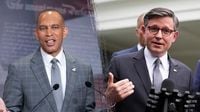The standoff in Washington over government funding has entered a new and particularly fraught phase, with the fate of millions of Americans’ health insurance premiums hanging in the balance. At the heart of the current shutdown is a fierce debate over whether Congress should extend the enhanced tax credits for those buying health insurance through the Affordable Care Act (ACA) Marketplace—a policy that, according to a recent KFF poll, is broadly popular across party lines.
Americans, it seems, are more united on this issue than their representatives in Congress. The KFF survey, conducted from September 23 to September 29, 2025, found that more than 78% of adults believe lawmakers should renew the enhanced credits. This support is not confined to one side of the political aisle: 92% of Democrats, 82% of independents, and even 59% of Republicans—including 57% of those who identify as MAGA supporters—want the tax credits extended. Non-MAGA Republicans are even more in favor, with 70% backing the measure. Despite this, the credits, enacted during the Biden administration as a pandemic-era relief measure, are set to expire at the end of the year.
The credits have been a lifeline for millions, helping to fuel four consecutive years of record ACA enrollment. Nearly 24 million people signed up for 2025 coverage, a surge widely attributed to these enhanced subsidies. But with the government shut down since October 1 and Congress deadlocked, the prospect of those credits vanishing is suddenly very real—and very near. Open enrollment for ACA plans begins November 1 in most states, and as Devon Trolley, executive director of the Pennsylvania Health Insurance Exchange Authority, pointed out, some states like Idaho kick off their enrollment as early as October 15. "When you’re talking about changing something, this is late. You know, like two weeks is not enough time to really do that without consumer disruption, consumer confusion and, to some extent, consumer degradation. Just from the confusion that it would cause," Trolley told The Hill.
For now, Republicans in Congress, led by Speaker Mike Johnson, insist there’s plenty of time to negotiate. Johnson, speaking on October 2, stated, “That’s not a simple issue. That’s going to take weeks to deliberate and discuss and debate, but that’s the beauty of the process. We have three months to do that. That is not an issue for today.” He reiterated that the credits don’t expire until December 31, suggesting talks can wait until after the government is funded. Senate Majority Leader John Thune echoed this sentiment, saying, “We can’t make commitments or promises on the COVID subsidies, because that’s not something that we can guarantee that there are the votes there to do.”
Democrats, however, see things very differently. They argue that the time for negotiation is now, before consumers are hit with skyrocketing premiums. Senator Patty Murray, a leading voice on the issue, warned, “We can’t accept an empty promise, which is, ‘Oh, we’ll deal with this later.’ The fact is that this crisis is in front of us now. People are getting this month their premium increases if the Senate does not act.” Murray has also accused Republicans of refusing to negotiate when the government was open, only to promise talks once the shutdown is resolved.
The stakes are high. If Congress fails to act, premiums could more than double, as insurers are already setting rates for 2026 based on the expectation that the enhanced credits might expire. In Colorado, for example, some consumers could see their premiums jump by 213%. Kevin Patterson, CEO of Connect for Health Colorado, expressed his concern: “I am worried that the sticker shock of sending out a message that says your premium is going to go up 213 percent because that’s one number we’re using in Colorado for one part of our state. We’ll get [consumers] where they won’t come back. Because when you shop for anything else, when you see something, you’re like, ‘Ooh, that’s too much.’ Do you go back? I mean, it’s a really tough point.”
It’s not just individuals who stand to lose. Small business employees and the self-employed—groups that disproportionately rely on the ACA Marketplace—would be directly impacted. The KFF poll found that 51% of respondents were very concerned about the effects on these workers, with another 33% somewhat concerned. Even among Republicans and MAGA supporters, more than 70% expressed worry about the fallout.
The geographic stakes are also notable. According to KFF’s analysis, 77% of ACA enrollees (about 18.7 million of the 24.3 million total) live in states that voted for Donald Trump in the 2024 election. These states have seen the largest growth in enrollment and have received the most in premium tax credits, underscoring the widespread impact of the policy regardless of political leanings.
Yet, the political messaging war rages on. On October 4, Speaker Johnson held a private call with House Republicans, urging them to keep the pressure on Democrats and touting the GOP’s unity. He assured his colleagues that the shutdown would end quickly if Republicans "hold the line," and canceled the week’s legislative session to allow members to focus on messaging in their districts. No Republicans voiced disagreement with his strategy, according to Fox News Digital, signaling a rare moment of party cohesion.
Meanwhile, Democrats blame Republicans for both the shutdown and the looming premium hikes. “Republicans would rather shut down the government than address a health care crisis that is threatening to shut down small businesses across the country. Right now, health care premiums are being locked in for next year,” Senator Murray said. The Biden administration’s record enrollment numbers, she argued, are at risk if the enhanced credits lapse.
Public awareness of the issue, however, remains low. The KFF poll revealed that 61% of respondents knew little or nothing about the tax credit debate, with only 7% claiming to know a lot. Still, when presented with the potential consequences, concern was widespread: 56% were very concerned about unaffordable health insurance, and 60% were very concerned about the estimated 4 million people who could lose coverage if the credits expire.
There are also worries about the price tag of extending the credits. The poll found that 27% were very concerned about the federal spending required, with another 36% somewhat concerned. Among Republicans, 41% were very concerned about the cost, and another 41% somewhat concerned—highlighting a classic policy trade-off between fiscal caution and social safety nets.
As the shutdown drags on, both parties are digging in. Republicans remain steadfast in their strategy, insisting that negotiations on the ACA credits can wait, while Democrats argue that the time to act is now, before millions are priced out of coverage. With open enrollment around the corner and no deal in sight, the coming weeks will test whether Congress can bridge the gap—or whether Americans will pay the price for Washington’s impasse.
For now, millions wait and watch, hoping lawmakers can find common ground before the clock runs out.




